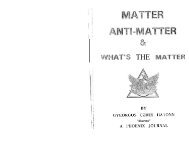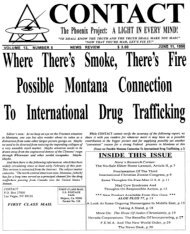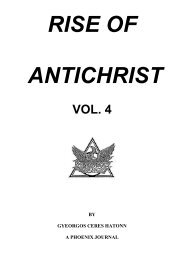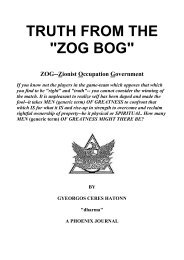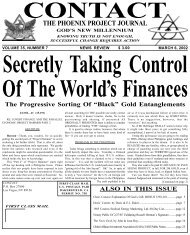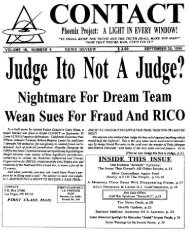VOL. 2 - Phoenix Source Distributors
VOL. 2 - Phoenix Source Distributors
VOL. 2 - Phoenix Source Distributors
Create successful ePaper yourself
Turn your PDF publications into a flip-book with our unique Google optimized e-Paper software.
Jewish traders were in South America 100 years before the Pilgrim Fathers landed at Plymouth<br />
Rock. Jews established the sugar industry in the Island of St. Thomas in 1492. They were well<br />
established in Brazil when only a few villages dotted the eastern coast of what is now the United<br />
States. And how far they penetrated when once they came here is indicated by the fact that the<br />
first White child born in Georgia was a Jew--Isaac Minis. The Jew's presence round the Earth, his<br />
clannishness with his own people, made him a nation scattered among the nations, a corporation<br />
with agents everywhere.<br />
Another talent, however, contributed greatly to his rise in financial power--his ability to invent<br />
new devices for doing business. Until the Jew was pitted against the world, business was very<br />
crudely done. And when we trace the origins of many of the business methods which simplify and<br />
facilitate trade today, more likely than not we find a Jewish name at the end of the clue. Many of the<br />
indispensable instruments of credit and exchange were thought out by Jewish merchants, not only<br />
for use between themselves, but to check and hold the Gentiles with whom they dealt. The oldest<br />
bill of exchange extant was drawn by a Jew--one Simon Rubens. The promissory note was a Jewish<br />
invention, as was also the check "payable to bearer".<br />
An interesting bit of history attaches to the "payable to bearer" instrument. The Jews' enemies<br />
were always stripping them of their last ounce of wealth, yet strangely, the Jews recovered very<br />
quickly and were soon rich again. How occured this sudden recovery from looting and poverty?<br />
Their assets were concealed under "bearer" and so a goodly portion was always saved. In an age<br />
when it was lawful for any pirate to seize goods consigned to Jews, the Jews were able to protect<br />
themselves by consigning goods on policies that bore no names.<br />
The influence of the Jew was to center business around goods instead of persons. Previously all<br />
claims had been against persons; the Jew knew that the goods were more reliable than the persons<br />
with whom he dealt, and so he contrived to have claims laid against goods. Besides, this device<br />
enabled him to keep himself out of sight as much as possible. This introduced an element of<br />
hardness into business, inasmuch as it was goods which were being dealt in rather than men being<br />
dealt with, and this hardness remains. Another tendency which survives and which is of advantage<br />
in veiling the very large control which Jews have attained, is of the same origin as "bearer" bills, it<br />
permits a business dominated by Jewish capital to appear under a name that gives no hint of Jewish<br />
control. [H: Son-of-a-gun!]<br />
The Jew is the only and original international capitalist, but as a rule he prefers not to emblazon<br />
that fact upon the skies; he prefers to use Gentile banks and trust companies as his agents and<br />
instruments. The suggestive term "Gentile front" often appears in connection with this practice. [H:<br />
Then, over the years, he got careless and more self-confidently superior in himself and wanted<br />
accolades to his grand SELF. This may prove to be his downfall after all.]<br />
The invention of the stock exchange is also credited to Jewish financial talent. In Berlin, Paris,<br />
London, Frankfurt and Hamburg, Jews were in control of the first stock exchanges, while Venice<br />
and Genoa were openly referred to in the talk of the day as "Jew cities" where great trading and<br />
banking facilities might be found. The Bank of England was established upon the counsel and<br />
assistance of Jewish emigrants from Holland. The Bank of Amsterdam and the Bank of Hamburg<br />
both arose through Jewish influence.<br />
There is a curious fact to be noted in connection with the persecution and consequent wandering<br />
of the Jews about Europe and that is: Wherever they wandered, the center of business seemed to go<br />
with them. When the Jews were free in Spain, there was the world's gold center. When Spain drove<br />
Page 82



